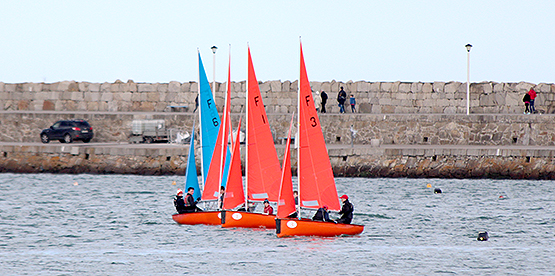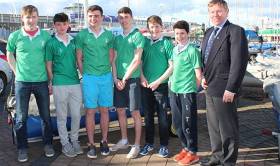Displaying items by tag: Leinster Schools
The Royal St. George Yacht Club hosted the Leinster Schools Team Racing Championships in Dun Laoghaire Harbour last Tuesday. In glorious sunshine 8 teams completed 31 races to provide a result.
The Round Robin was tightly fought, with a 3 way tie between Loreto St. Stephens Green, Loreto Dalkey and St. Conleths, with Loreto St. Stephens Green coming out on top after a count back on points to break the tie.
In the finals it was Gonzaga versus Kilkenny and this went to the wire, with both teams having a win each. Now we were down to a nail biting 3rd race in which Gonzaga took the spoils. This was the second time running that Gonzaga have won the Leinster Schools Trophy. Commiserations to Kilkenny who gave Gonzaga quite a challenge.

Leinster Schools Team Racing action at Dun Laoghaire
The top four teams qualify for the Irish Schools Team Racing Championships which will be hosted at the F.O.M.E.C. sailing centre in Schull on the 9th & 10th of April.
Adam Hyland (R.S.G.Y.C.) was the Race Officer and did an excellent job of completing the event, with a number of wind shifts throughout the day. Ailbe Millerick was the Chief Umpire and was assisted by Dave Sheahan.
Thank you to everyone who assisted in the organising and running of the event.
All the competitors deserve acknowledgement for the lovely manner in which they conducted themselves both on and off the water throughout the event.
The final results were as follows:
1st Gonzaga College
2nd Kilkenny
3rd Loreto St. Stephens Green (Tie Break 20 Points)
4th Loreto Dalkey (Tie Break 21 Points)
5th St. Conleths (Tie Break 22 Points)
6th St. Andrews 1
7th Belvedere College
8th St. Andrews 2





























































